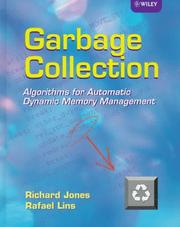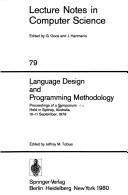| Listing 1 - 3 of 3 |
Sort by
|

ISBN: 0471941484 9780471941484 Year: 1999 Publisher: Chichester Wiley
Abstract | Keywords | Export | Availability | Bookmark
 Loading...
Loading...Choose an application
- Reference Manager
- EndNote
- RefWorks (Direct export to RefWorks)
681.3*D33 --- 681.3*D34 --- 681.3*D34 Processors: code generation compilers interpreters optimization parsing preprocessors run-time environments translator writing systems and compilergenerators (Programming languages) --- Processors: code generation compilers interpreters optimization parsing preprocessors run-time environments translator writing systems and compilergenerators (Programming languages) --- 681.3*D33 Languages constructs: abstract data types concurrent programming structurescontrol structures coroutines (Programming languages) --- Languages constructs: abstract data types concurrent programming structurescontrol structures coroutines (Programming languages) --- Computer algorithms --- Garbage collection (Computer science) --- Memory management (Computer science) --- 681.3*D33 Languages constructs: abstract data types; concurrent programming structures;control structures; coroutines (Programming languages) --- Languages constructs: abstract data types; concurrent programming structures;control structures; coroutines (Programming languages) --- Management of computer memory --- Computer storage devices --- Loop tiling (Computer science) --- Algorithms --- 681.3*D34 Processors: code generation; compilers; interpreters; optimization; parsing; preprocessors; run-time environments; translator writing systems and compilergenerators (Programming languages) --- Processors: code generation; compilers; interpreters; optimization; parsing; preprocessors; run-time environments; translator writing systems and compilergenerators (Programming languages) --- Computer science --- geheugenbeheer --- algoritmen --- Programming --- Computer algorithms. --- Garbage collection (Computer science). --- Memory management (Computer science). --- Gestion mémoire (Informatique) --- Algorithmes
Book
ISBN: 3540578595 0387578595 3642859852 3642859836 9783540578598 Year: 1994 Volume: 131
Abstract | Keywords | Export | Availability | Bookmark
 Loading...
Loading...Choose an application
- Reference Manager
- EndNote
- RefWorks (Direct export to RefWorks)
Constraint programming (Computer science) --- 681.3*D32 --- 681.3*D33 --- 681.3*F12 --- 681.3*I23 --- 681.3*I23 Deduction and theorem proving: answer/reason extraction reasoning resolution metatheory mathematical induction logic programming (Artificial intelligence) --- Deduction and theorem proving: answer/reason extraction reasoning resolution metatheory mathematical induction logic programming (Artificial intelligence) --- 681.3*F12 Modes of computation: alternation and nondeterminism parallelism probabilistic computation relations among modes relativized computation --- Modes of computation: alternation and nondeterminism parallelism probabilistic computation relations among modes relativized computation --- 681.3*D33 Languages constructs: abstract data types concurrent programming structurescontrol structures coroutines (Programming languages) --- Languages constructs: abstract data types concurrent programming structurescontrol structures coroutines (Programming languages) --- 681.3*D32 language classifications: applicative languages data-flow languages design languages extensible languages macro and assembly languages nonprocedural languages specialized application and very high-level languages (Programminglanguages) --- language classifications: applicative languages data-flow languages design languages extensible languages macro and assembly languages nonprocedural languages specialized application and very high-level languages (Programminglanguages) --- language classifications: applicative languages; data-flow languages; design languages; extensible languages; macro and assembly languages; nonprocedural languages; specialized application and very high-level languages (Programminglanguages) --- Languages constructs: abstract data types; concurrent programming structures;control structures; coroutines (Programming languages) --- Modes of computation: alternation and nondeterminism; parallelism; probabilistic computation; relations among modes; relativized computation --- Deduction and theorem proving: answer/reason extraction; reasoning; resolution; metatheory; mathematical induction; logic programming (Artificial intelligence) --- 681.3*I23 Deduction and theorem proving: answer/reason extraction; reasoning; resolution; metatheory; mathematical induction; logic programming (Artificial intelligence) --- 681.3*F12 Modes of computation: alternation and nondeterminism; parallelism; probabilistic computation; relations among modes; relativized computation --- 681.3*D33 Languages constructs: abstract data types; concurrent programming structures;control structures; coroutines (Programming languages) --- 681.3*D32 language classifications: applicative languages; data-flow languages; design languages; extensible languages; macro and assembly languages; nonprocedural languages; specialized application and very high-level languages (Programminglanguages) --- Computer programming

ISBN: 0387097430 0387097449 9786611953836 1281953830 0387097457 3540097457 3540385797 3540097430 3540385754 9783540097433 9783540097457 9780387097459 9780387097442 Year: 2009 Volume: 176 Publisher: New York, NY : Springer New York : Imprint: Springer,
Abstract | Keywords | Export | Availability | Bookmark
 Loading...
Loading...Choose an application
- Reference Manager
- EndNote
- RefWorks (Direct export to RefWorks)
Antisocial acts by children and teens are on the rise – from verbal abuse to physical bullying to cyber-threats to weapons in schools. Strictly punitive responses to aggressive behavior may even escalate a situation, leaving peers, parents, and teachers feeling helpless. This unique volume conceptualizes aggression as a symptom of underlying behavioral and emotional problems and examines the psychology of perpetrators and the power dynamics that foster intentionally hurtful behavior in young people. It details for readers how bibliotherapy offers relevant, innovative, and flexible treatment – as a standalone intervention or as a preventive method in conjunction with other forms of treatment – and can be implemented with individuals and groups, parents, teachers, and even rivals. Treating Child and Adolescent Aggression Through Bibliotherapy: Offers research-based guidelines for treating aggression in children and adolescents. Provides an integrative approach to treating aggressive children and youth to more fully address the complex nature of antisocial behavior. Sets out a practical framework for bibliotherapy, choosing developmentally appropriate materials, identifying themes for discussion, matching selections to therapeutic progress, and more. Demonstrates individual and group bibliotherapy sessions with male and female children and adolescents. Includes a complete session-by-session prevention program for the classroom. Features an appendix of suggestions for effective therapeutic literature. This unique, must-have resource is essential reading for school psychologists, school counselors, social workers, and clinical child psychologists and any allied educational and mental health professionals who work with troubled youth.
Aggression -- Psychology. --- Aggressiveness in adolescence -- Treatment. --- Aggressiveness in children -- Treatment. --- Bibliotherapy for children. --- Bibliotherapy for teenagers. --- Aggressiveness in children --- Aggressiveness in adolescence --- Bibliotherapy for children --- Bibliotherapy for teenagers --- Psychology --- Bibliotherapy --- Aggression --- Adolescent --- Child --- Methods --- Behavioral Sciences --- Social Behavior --- Age Groups --- Investigative Techniques --- Behavioral Symptoms --- Rehabilitation --- Psychotherapy --- Behavioral Disciplines and Activities --- Behavior --- Analytical, Diagnostic and Therapeutic Techniques and Equipment --- Therapeutics --- Persons --- Behavior and Behavior Mechanisms --- Named Groups --- Psychiatry and Psychology --- Pediatrics --- Medicine --- Health & Biological Sciences --- Treatment --- Treatment. --- Aggressiveness (Psychology) in adolescence --- Aggressiveness (Child psychology) --- Aggressiveness (Psychology) in children --- Tools and techniques: decision tables flow charts modules and interfaces programmer workbench software libraries structured programming top-down programming user interfaces (Software engineering) --- language classifications: applicative languages data-flow languages design languages extensible languages macro and assembly languages nonprocedural languages specialized application and very high-level languages (Programminglanguages) --- Languages constructs: abstract data types concurrent programming structurescontrol structures coroutines (Programming languages) --- Process management: concurrency deadlocks multiprocessing/multiprogrammingmutual exclusion scheduling synchronization (Operating systems) --- 681.3*D33 Languages constructs: abstract data types concurrent programming structurescontrol structures coroutines (Programming languages) --- 681.3*D32 language classifications: applicative languages data-flow languages design languages extensible languages macro and assembly languages nonprocedural languages specialized application and very high-level languages (Programminglanguages) --- 681.3*D22 Tools and techniques: decision tables flow charts modules and interfaces programmer workbench software libraries structured programming top-down programming user interfaces (Software engineering) --- 681.3*D41 Process management: concurrency deadlocks multiprocessing/multiprogrammingmutual exclusion scheduling synchronization (Operating systems) --- Diminishing returns --- Multiplication, Complex. --- Psychology. --- Education. --- Social work. --- Clinical psychology. --- Psychotherapy. --- Counseling. --- Child psychology. --- School psychology. --- Personality. --- Social psychology. --- Clinical Psychology. --- Child and School Psychology. --- Education, general. --- Psychotherapy and Counseling. --- Social Work. --- Personality and Social Psychology. --- Programming --- 681.3*A0 --- 681.3*D22 --- 681.3*D32 --- 681.3*D33 --- 681.3*D41 --- 681.3*D33 Languages constructs: abstract data types; concurrent programming structures;control structures; coroutines (Programming languages) --- Languages constructs: abstract data types; concurrent programming structures;control structures; coroutines (Programming languages) --- 681.3*D32 language classifications: applicative languages; data-flow languages; design languages; extensible languages; macro and assembly languages; nonprocedural languages; specialized application and very high-level languages (Programminglanguages) --- language classifications: applicative languages; data-flow languages; design languages; extensible languages; macro and assembly languages; nonprocedural languages; specialized application and very high-level languages (Programminglanguages) --- 681.3*D22 Tools and techniques: decision tables; flow charts; modules and interfaces; programmer workbench; software libraries; structured programming; top-down programming; user interfaces (Software engineering) --- Tools and techniques: decision tables; flow charts; modules and interfaces; programmer workbench; software libraries; structured programming; top-down programming; user interfaces (Software engineering) --- 681.3*A0 General --- General --- 681.3*D41 Process management: concurrency; deadlocks; multiprocessing/multiprogramming;mutual exclusion; scheduling; synchronization (Operating systems) --- Process management: concurrency; deadlocks; multiprocessing/multiprogramming;mutual exclusion; scheduling; synchronization (Operating systems) --- Adolescent psychotherapy --- Child psychotherapy --- Adolescent psychology --- Child psychology --- Conduct disorders in children --- Curves, Elliptic. --- Programming languages (Electronic computers) --- Computer programming --- Langages de programmation --- Programmation (Informatique) --- Congresses --- Congrès --- Psychology, clinical. --- Developmental psychology. --- Applied psychology. --- Consciousness. --- Apperception --- Mind and body --- Perception --- Philosophy --- Spirit --- Self --- Benevolent institutions --- Philanthropy --- Relief stations (for the poor) --- Social service agencies --- Social welfare --- Social work --- Human services --- Applied psychology --- Psychagogy --- Psychology, Practical --- Social psychotechnics --- Development (Psychology) --- Developmental psychobiology --- Life cycle, Human --- Software engineering. --- Software Engineering. --- Computer software engineering --- Engineering --- Children --- Education, Primitive --- Education of children --- Human resource development --- Instruction --- Pedagogy --- Schooling --- Students --- Youth --- Civilization --- Learning and scholarship --- Mental discipline --- Schools --- Teaching --- Training --- Psychology, School --- Psychology, Applied --- Behavior, Child --- Child behavior --- Child study --- Pediatric psychology --- Child development --- Developmental psychology --- Psychiatry --- Psychological tests --- Mass psychology --- Psychology, Social --- Human ecology --- Social groups --- Sociology --- Personal identity --- Personality psychology --- Personality theory --- Personality traits --- Personology --- Traits, Personality --- Individuality --- Temperament --- Counselling --- Helping behavior --- Clinical sociology --- Interviewing --- Personal coaching --- Social case work --- Therapy (Psychotherapy) --- Mental illness --- Mental health counseling --- Education --- Logique --- Courbes elliptiques --- Nombres, Théorie des --- Langages de programmation.
| Listing 1 - 3 of 3 |
Sort by
|

 Search
Search Feedback
Feedback About
About Help
Help News
News